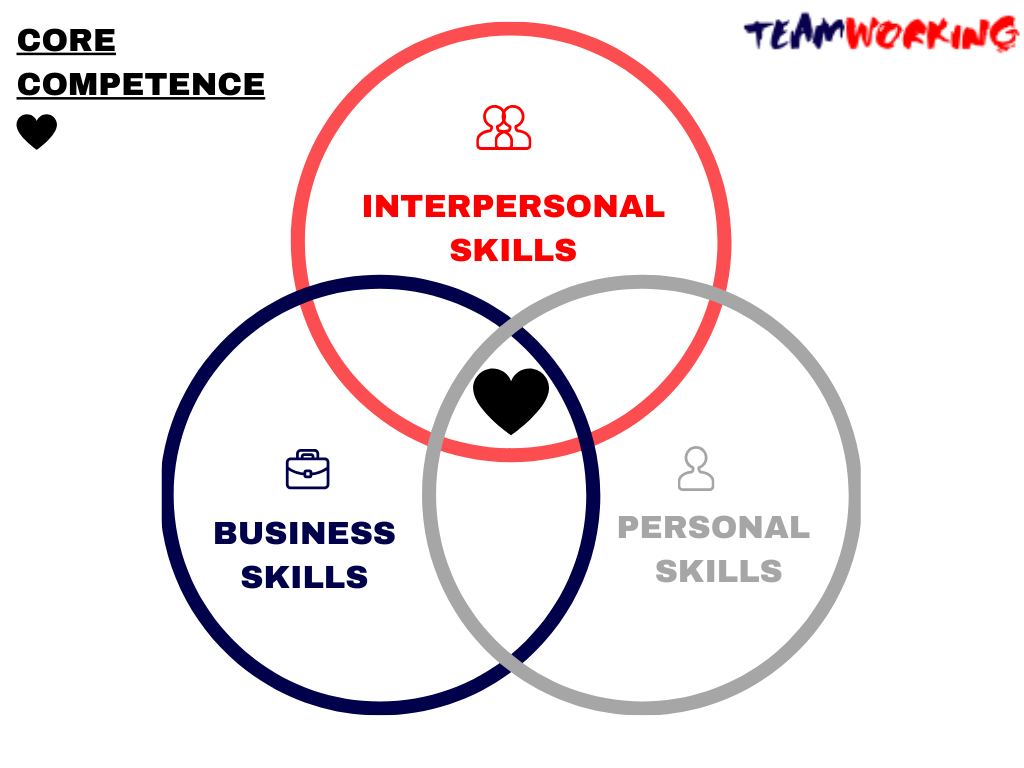What are the Competencies?
The concept of “competence” embraces many different areas. In general, we can say that competence in the workplace is the ability to manage work effectively.
All this, while simultaneously implementing skills, commitment and knowledge. Therefore, employees must possess and know how to carefully use the necessary tools, such as knowledge and skills. Most of all, though, they must also know how to organize them first in their mind and then in reality.
It follows, therefore, that such a competence is closely linked both to the individual and to the context. It’s natural, therefore, that the company identifies and keeps under control the skills of the staff. It does this especially in relation to the key competencies – or core competencies – which is what distinguishes it from the competition.
An important re-engineering principle is that companies should focus on their core competence and outsource everything else.
What competence does the company need?
If we want to understand whether or not the Team has the right skills, we must first understand what are the specific ones necessary for the Company itself.
The analysis of Competencies is a great and important tool for the verification of the business development. It is a process capable of orienting the organization in terms of investments, strategies and organizational improvement. After analyzing the skills necessary for applying to professional life, you can focus on your personal ones. That is, those closely related to the company’s core business.
What are the most important Competencies?
In general, there are two most important skills. The technical and managerial ones, as they contain the foundations of any company.
Small businesses often view technical skills as a starting point. But those who can make the biggest change by making the difference are managerial skills. This is true both in a multinational company and in a family-run one.
Furthermore, the managerial and technical skills divide into three groups. These are:
- Technical skills: refer to the knowledge and skills required in a specific type of job or activity. These types of skills can be developed through professional training programs, including in the workplace.
- Human skills: refers to the skills of the people required to work in the right way with colleagues and superiors. This includes communication skills, the ability to motivate others and create a team spirit. A leader with high human abilities is aware of his behavior and how it can influence followers.
- Conceptual skills: these are the skills that allow the leader to work with thought. Leaders with good conceptual skills are good at working with abstract ideas and hypothetical situations. These include decision making and problem solving.
After defining the necessary skills, a true leader must also be able to assess whether the company already has them and at what level.
For instance, a top management will need less technical skills and more conceptual skills to have a holistic view of the organization.
How do we get them? Through training or by hiring figures that already own them?
It seems strange to say, yet some skills can be “purchased”. An example may be Vodafone which, rather than investing in the internal growth of its company, preferred to acquire an external company (Tele2) which already had the necessary skills.
The skills that cannot be purchased, on the other hand, represent the company’s core business and are those in which we must invest, ensuring that they are protected, developed and enhanced.
What is the core competence?
The company’s distinctive (core) skills are resources capable of producing added value. They are often difficult or impossible to replace or imitate because they come from a combination of different resources. In fact, they are the combination of three different types of skills: interpersonal, personal and business. They’re intrinsic characteristics of a company, configurable as “special” as they allow the company to be more competitive. Therefore, they are also considered a determining factor in the competitive system. Your strength must have a positive impact on your customers to be a core competence.
How do I recognize a Core Competence?
Three tests can be applied to determine if the competency is a fundamental one:
- It can lead to the development of new products and services and must provide possible access to a wide assortment of markets.
- It should be hard for rivals to imitate. In many businesses, such competencies are likely to be unique.
- It must make a huge contribution to the benefits of the final product.

Why is it so important to define Competencies?
In the growth process, many define a goal and then get lost when it comes to deciding how to achieve it. From the abstract part of the Vision it is therefore necessary to move to a more concrete phase, the Mission. This ignites the real interest of the team. From the Mission, then, we move on to defining the Values and understanding the Competence necessary to achieve the set objectives. If the necessary tools and knowledge are not clear, team success will never be possible.
Recognizing and developing your company’s key competencies contribute to your company’s long-term competitive advantage. In determining the key competencies of your company, it is important to identify the skills, knowledge, experience and technology. In addition, it is important to know the process that allows your company to provide its unique set of products or services.
Usually, high-performance companies develop new key skills and increase existing ones to insert in already existing and future markets. A company at this operating level can recognize the needs of customers. This allows it to develop the necessary skills to satisfy any type of request. Company leadership should be aware that even the most successful strategy will eventually fail unless it is frequently supervised and refreshed to meet every changing market condition.
This is what the first phase of a Team Coaching training is needed for: our staff of experts is prepared to help companies first of all to align.
